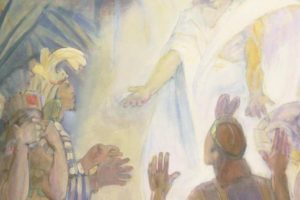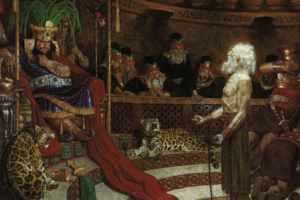One of the great Messianic prophecies of the Tanakh is the Suffering Servant prophecy of Isaiah 53. An interesting point about this prophecy is a problem in the original Hebrew of the Masoretic Text of Isaiah 53:11.
The Hebrew of the Masoretic Text reads literally:
מֵעֲמַ֤ל נַפְשֹׁו֙ יִרְאֶ֣ה
יִשְׂבָּ֔ע בְּדַעְתֹּ֗ו יַצְדִּ֥יק
צַדִּ֛יק עַבְדִּ֖י לָֽרַבִּ֑ים
וַעֲוֹנֹתָ֖ם ה֥וּא יִסְבֹּֽל׃
From the travail of his soul he shall see
he shall be satisfied in his understanding.
My Righteous servant shall justify many
and their iniquities he bears.
The Hebrew includes two verbs back-to-back— “shall see” and “shall be satisfied”—with no object, which is ungrammatical in Hebrew. Clearly the servant should “see” something. The missing word, or the item the servant sees, is “light” and has turned up in the two complete Hebrew copies of Isaiah found at Qumran [1QIsa(a) & 1QIsa(b)]:
From the travail of his soul he shall see light
he shall be satisfied in his understanding.
My Righteous servant shall justify many
and their iniquities he bears.
The missing word “light” also appears in the ancient Greek Septuagint translation of Isaiah.
In the Qumran and Septuagint versions of Isaiah 53:11, we seem to have a prophecy of the resurrection of Messiah, in that after the suffering servant dies in Isaiah 53:8-10 he sees light in verse 11.
When Avinodi quotes Isaiah 52:11 (presumably from the “Brass Plates” version of Isaiah) The Stick of Joseph follows the KJV, which follows the Masoretic text in this verse, omitting the word “light” (Moshiyah 8:5). Therefore, Avinodi’s statement matches the KJV.
However, when Avinodi goes on to comment upon the prophecy, he is clearly aware that the word “light” was in this passage, as he says:
And now, if Mashiach had not come into the world, speaking of things to come as though they had already come, there could have been no redemption. And if Mashiach had not risen from the dead, or had not broken the bands of death, that the grave should have no victory and that death should have no sting, there could have been no resurrection. But there is a resurrection; therefore the grave has no victory, and the sting of death is swallowed up in Mashiach. He is the light and the life of the world — yes, a light that is Eyn Sof, that can never be darkened, yes, and also a life which is Eyn Sof, that there can be no more death. (Moshiyah 8:14)
It is no coincidence that Avinodi sees not only the death of the Messiah, but also his resurrection in Isaiah 53, and even more so is it beyond coincidence that Avinodi connects this resurrection of Messiah in Isiah 53 to “light.” Yosef ben Yosef could not have known that there is a grammatical problem with the Masoretic text in Isaiah 53, and he could not have known that the undiscovered Hebrew copies of Isaiah, still sitting in clay jars in a cave at Qumran, had the missing word “light” in this verse. And he was very unlikely to know that the Greek Septuagint had “light” in this verse. Had he known, surely he would have inserted the word in the quotation of Isaiah 53:11 in Moshiyah 8:5, rather than simply quoting the KJV version of the verse instead.
Did the Brass Plates contain the missing word? Or did Avinodi know the missing word from a direct revelation? We may never know. But we can know that if this record was not authentic, it could not have Avinodi comment upon the missing word of this verse.






1 Comment
Leave your reply.